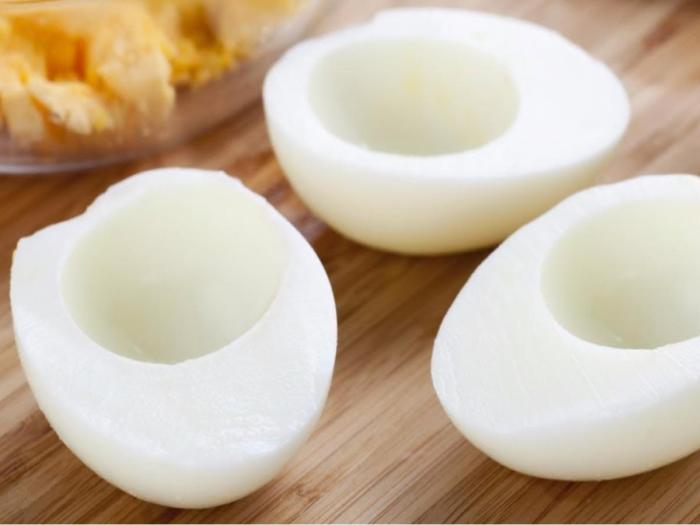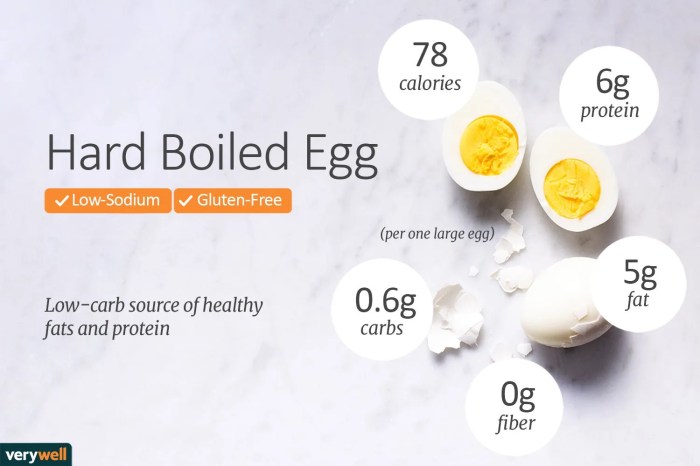Boiled Egg Whites in Different Diets

Nutrition facts of boiled egg white – Boiled egg whites, a nutritional powerhouse, play diverse roles across various dietary approaches. Their high protein content and low fat profile make them a versatile ingredient adaptable to numerous eating plans, from high-protein regimens to those focusing on carbohydrate restriction. Understanding how egg whites function within these different contexts is crucial for maximizing their nutritional benefits.Boiled egg whites are particularly valuable in diets emphasizing macronutrient manipulation.
Boiled Egg Whites in High-Protein and Low-Carbohydrate Diets
In high-protein diets, often employed for muscle building or weight management, boiled egg whites contribute significantly to the daily protein intake. Their low carbohydrate content makes them ideal for individuals following low-carb approaches like ketogenic diets, where minimizing carbohydrate consumption is paramount. The protein in egg whites helps maintain satiety, reducing cravings and aiding in weight management. For instance, a bodybuilder aiming for a 200g daily protein intake might include several boiled egg whites as part of their meal plan.
Similarly, someone on a ketogenic diet can rely on boiled egg whites as a source of protein without significantly impacting their daily carbohydrate count. The high biological value of egg white protein, meaning it contains all essential amino acids, makes it especially beneficial for muscle repair and growth in high-protein diets and helps maintain muscle mass during periods of restricted carbohydrate intake in low-carb diets.
Incorporating Boiled Egg Whites into Vegetarian and Vegan Diets
While eggs are inherently non-vegetarian, egg white protein powder offers a way to incorporate the benefits of egg whites into vegetarian and even vegan diets. This powder is made by separating the egg whites from the yolks, drying, and milling them into a powder. It’s a convenient and efficient way to add protein to smoothies, baked goods, or other recipes.
However, it’s crucial to note that while egg white protein powder can supplement protein intake, it doesn’t replace the complete nutritional profile of whole eggs. A vegetarian might use egg white protein powder to boost the protein content of a breakfast smoothie, while a vegan would likely choose it as a supplement to plant-based protein sources to ensure they are meeting their daily protein requirements.
It’s essential to verify the product’s source and ensure it aligns with the individual’s dietary needs and preferences.
Sample Weekly Meal Plan Incorporating Boiled Egg Whites
A balanced meal plan incorporating boiled egg whites can be easily designed to meet diverse nutritional needs. The following is an example, emphasizing variety and balanced macronutrient distribution. Note that portion sizes should be adjusted based on individual caloric needs and activity levels.
Boiled egg whites are a powerhouse of protein, low in calories and fat, making them a diet staple. However, if you’re looking for a sweet treat that’s relatively low in calories, you might consider checking out the nutrition facts for halo top ice cream for comparison. Ultimately, understanding the nutritional profile of both boiled egg whites and other foods helps make informed choices about your diet.
| Day | Breakfast | Lunch | Dinner |
|---|---|---|---|
| Monday | 2 boiled egg whites, whole-wheat toast, berries | Salad with grilled chicken or tofu, 1 boiled egg white | Salmon with roasted vegetables, 1 boiled egg white |
| Tuesday | Omelet with 2 egg whites and vegetables | Lentil soup, whole-grain bread, 1 boiled egg white | Chicken stir-fry with brown rice |
| Wednesday | Greek yogurt with 2 boiled egg whites and fruit | Leftover chicken stir-fry | Vegetarian chili with cornbread |
| Thursday | Smoothie with egg white protein powder, spinach, banana | Tuna salad sandwich on whole-wheat bread | Lean beef with sweet potato and green beans |
| Friday | Scrambled egg whites with mushrooms and onions | Leftover vegetarian chili | Baked chicken breast with quinoa and broccoli |
| Saturday | Pancakes made with egg white protein powder, berries | Large salad with grilled fish or chickpeas | Pizza with whole-wheat crust and vegetables |
| Sunday | Breakfast burrito with egg whites, black beans, and salsa | Leftover pizza | Roast chicken with roasted potatoes and carrots |
Preparation and Storage of Boiled Egg Whites

Boiling egg whites perfectly requires attention to detail to achieve the desired texture while preserving their nutritional value. Proper storage is equally crucial to maintain freshness and prevent spoilage. This section details the optimal methods for both processes.
The following steps Artikel the preparation of perfectly boiled egg whites, emphasizing techniques that maximize nutrient retention and yield a desirable consistency.
Boiling Egg Whites for Optimal Texture and Nutrient Retention
- Gentle Heating: Place the egg whites in a small saucepan and add enough water to cover them completely. Bring the water to a gentle simmer over medium-low heat. Avoid a rolling boil, as this can lead to rubbery whites.
- Precise Timing: Simmer the egg whites for approximately 3-5 minutes, depending on desired firmness. For a slightly soft texture, cook for 3 minutes. For firmer whites, cook for 5 minutes. Overcooking will result in tough, dry egg whites.
- Immediate Cooling: Once cooked, immediately remove the saucepan from the heat and transfer the egg whites to a bowl filled with ice water. This stops the cooking process and prevents further firming.
- Gentle Handling: Carefully remove the egg whites from the ice water and gently pat them dry with a paper towel. Avoid rough handling, which can damage the delicate protein structure.
Proper storage is essential to maintain the quality and safety of boiled egg whites. The following tips ensure freshness and prevent bacterial growth.
Safe Storage of Boiled Egg Whites, Nutrition facts of boiled egg white
Storing boiled egg whites correctly is vital for maintaining their quality and preventing bacterial contamination. This section details appropriate storage techniques to maximize shelf life and safety.
- Rapid Cooling and Refrigeration: After boiling and cooling, promptly refrigerate the egg whites in an airtight container. This prevents bacterial growth and maintains freshness.
- Airtight Container: Use an airtight container to prevent exposure to air and moisture, which can promote bacterial growth and reduce the quality of the egg whites.
- Shelf Life: Boiled egg whites stored properly in the refrigerator can generally be kept for 3-4 days. After this time, their quality may begin to decline, and the risk of bacterial growth increases.
- Freezing for Extended Storage: For longer storage, consider freezing the boiled egg whites in an airtight freezer-safe container. Frozen egg whites can last for several months without significant loss of nutritional value.
Nutritional Value Differences Between Freshly Boiled and Stored Egg Whites
While the nutritional content of egg whites remains relatively stable during short-term storage, some subtle changes can occur over time. This section explores these differences.
Freshly boiled egg whites retain the maximum amount of their water-soluble vitamins, such as riboflavin and vitamin B12. Over time, and particularly after several days of refrigeration, some nutrient degradation may occur, although the impact is typically minimal. The protein content remains largely unchanged, but the texture and overall palatability may decrease after prolonged storage. Freezing can help preserve the nutritional value better than extended refrigeration, minimizing nutrient loss over several months.
FAQ Overview: Nutrition Facts Of Boiled Egg White
Are boiled egg whites good for weight loss?
Yes, their high protein content promotes satiety, helping you feel fuller for longer and potentially reducing overall calorie intake. They are also low in calories and fat.
Can I eat too many boiled egg whites?
While generally safe, consuming excessive amounts of egg whites could lead to biotin deficiency (biotin is found in the yolk) and potentially an imbalance of nutrients. Moderation is key.
Do boiled egg whites contain cholesterol?
No, cholesterol is primarily found in the egg yolk, not the white.
How long can I store boiled egg whites in the refrigerator?
Stored properly in an airtight container, boiled egg whites generally remain safe to consume for 3-4 days.
